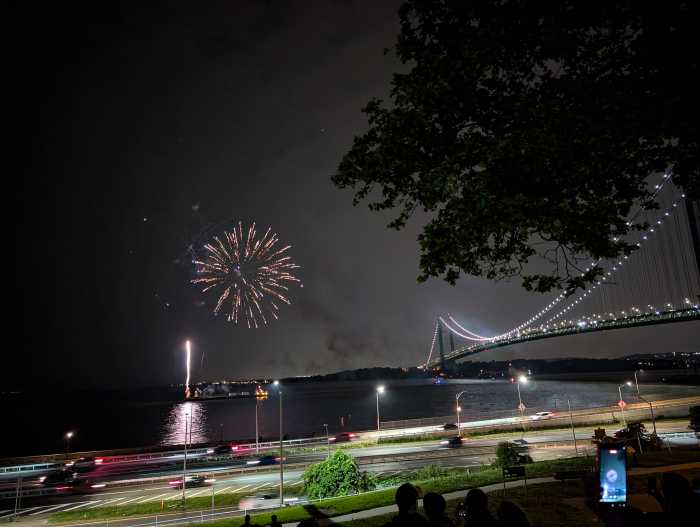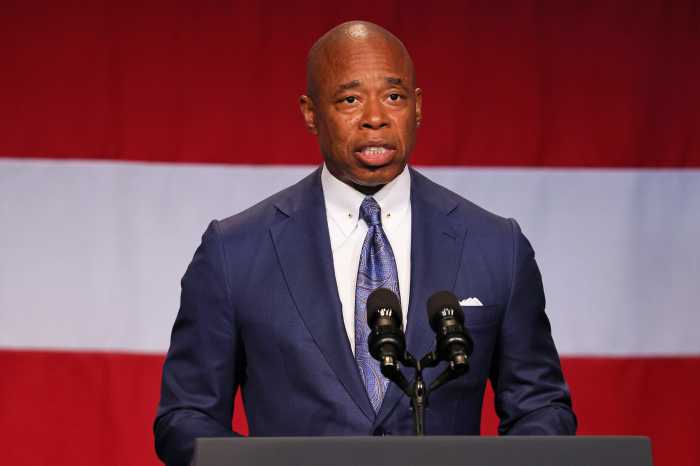Gore Vidal at age 23 in 1948. | CARL VAN VECHTEN/ WIKIMEDIA COMMONS
The Best Man is gone, and we are all orphans. Gore Vidal, America’s most brilliantly wide-ranging man of letters, who has been a beacon of light for queers for six decades, finally left us on July 31 at the age of 86.
His death was something those of us who loved and revered him had feared for years — he fought a long battle with Epstein-Barr syndrome, and his health had been in sharp decline ever since the death of his life partner of 53 years, Howard Austen, nine years ago.
“Uncle Gore,” as he was fondly referred to by many writers of my generation, burst onto the literary scene in 1946 at the age of just 20 when he published the finely chiseled “Williwaw,” a cynical portrait of war, based on Vidal’s naval service in the Aleutian Islands in the closing years of World War II. The novel won Vidal comparisons to Stephen Crane, a writer he much admired. “Williwaw” was such a critical success that it immediately propelled Vidal into the front ranks of the new generation of writers who emerged from the war, including James Jones, Norman Mailer, Kurt Vonnegut, and J.D. Salinger. He was one of those featured in a Life magazine cover story on these new writers, winning him instant celebrity.
He did not follow in the career path of Crane, who burned the manuscript of his novel of a 15-year-old boy prostitute, as Edmund White tells us in his historically based novel “Hotel de Dreams.” In 1948, Vidal published his third novel, “The City and the Pillar,” a love story of two masculine, boy-next-door young Americans; it was the nation’s first work of literary quality to portray male homosexuality as a natural variant of human existence.
It is difficult to overstate the courage Vidal demonstrated in publishing “The City and the Pillar” in his early years as a writer. At that time, homosexuality was both a crime and, in the eyes of the medical establishment, a debilitating “disease” — as well as the great American taboo. But honesty, both intellectual and moral, was an innate Vidal quality all his life — he always said and wrote exactly what he thought, no matter what the cost.
And oh, what a cost there was. Orville Prescott, then the reigning literary czar of the New York Times, denounced “The City and the Pillar” as “pornography” (though there’s little description of physical coupling in any of Vidal’s fictions) and refused to permit any Times review of Vidal’s next seven books. The newspaper refused even to run any paid advertisements for the groundbreaking novel. The country’s most important magazines of that time followed suit, and Vidal was in essence blacklisted for years by the lit-crit business, which pigeon-holed him as a “fag.”
But “The City and the Pillar” went on to become an American classic, and when published in paperback sold well over a million copies, helping a great number of “same-sexers” — a preferred Vidal vocable — to accept themselves and come out, including this writer.
One of America’s most erudite and cosmopolitan writers, Vidal was largely an autodidact who never attended college. As the scion of an old patrician political family — his grandfather, Thomas Gore, who helped raise him, was a maverick US senator and his father was the federal government’s top aviation bureaucrat in the 1930s — Vidal went to the best private schools, St. Alban’s and Phillips Exeter, but eschewed his destined place at Harvard. Instead, he enlisted in the navy in the closing phase of the war, at a time when a prospective invasion of Japan loomed large.
“The City and the Pillar” was dedicated to “J.T.,” whom Vidal, in his scintillating 1995 memoir “Palimpsest,” revealed to have been James “Jimmy” Trimble III, who had been killed at the battle of Iwo Jima, and with whom he’d had a passionate affair at St. Alban’s. He described Trimble as the greatest love of his life.
Politics, of course, was always central, in one way or another, to Vidal’s fiction. He first seriously dealt with imperialism in the 1950 novel “Dark Green, Bright Red,” about American interference in Central America. Set in Guatemala, the book prefigured the CIA-sponsored coup four years later against the radical left-wing government of President Jacobo Arbenz at the behest of the US multinational United Fruit, whose corporate colors were green and red.
When his serious post-“City and the Pillar” novels were blacked out by the Times and the other powerful critics, Vidal, under the pseudonym Edgar Box, churned out in a few weeks each a series of entertaining detective stories, which were commercially successful and kept him in funds for the next decade. Even here, he continued to probe politics and present homosexuality as natural, as in the delightful 1952 Box mystery “Death in the Fifth Position,” a satire of McCarthyism featuring a sweatily masculine ballet dancer who chased everything in pants.
For economic reasons, he also moved into writing original dramas for live television during its so-called Golden Age in the 1950s — work that brought him to the notice of Hollywood and a new career as a screenwriter. His film scripts included “Ben-Hur,” into which, as he was quoted saying in Vito Russo’s “The Celluloid Closet,” he introduced a homosexual subtext between the actors Stephen Boyd and Charlton Heston, which he and director William Wyler conspired to conceal from the notoriously homophobic Heston. He also wrote the screenplays of “I Accuse,” the acclaimed film version of the Alfred Dreyfus affair starring José Ferrer, “Suddenly Last Summer,” and “Is Paris Burning?”
Vidal regained celebrity status by writing for Broadway — where his homosexuality was not an issue — scoring hits with “Visit to a Small Planet” (1958) and “The Best Man” (1960), for which he also wrote the screenplay of a 1964 film that starred Henry Fonda.
With the money he’d made from Hollywood, Vidal and Austen, in the early ‘60s, moved to Italy, where they found and bought their famous home in Ravello. It was there that Vidal completed his literary rehabilitation by writing the 1964 novel “Julian,” about the apostate Roman emperor, which surprisingly soared to number one on the Times’ bestseller list. “Julian,” though set in the fourth century A.D., was, in reality, a novel about the timeless perils of empire and a metaphor for the way Vidal saw America.
Always a visceral dissident with a keen interest in the early ‘60s New Left, Vidal was further radicalized by the Vietnam War and the social movements of the ‘60s. An important precursor to this shift came out of his profound disillusionment with the administration of John F. Kennedy — even though he had been a frequent White House guest of JFK and his wife, Jackie, with whom Vidal shared a stepfather Hugh Auchincloss — a disaffection he codified in a famous 1967 Esquire essay, “The Holy Family.”
Vidal also established himself as our most formidable political polemicist as a founding essayist of the New York Review of Books, launched during the city’s newspaper strike of 1963. Many of his best political essays appeared there, including those later collected in such essential books as “Homage to Daniel Shays,” “Reflections Upon a Sinking Ship,” and “The Second American Revolution,” as well as in “Pink Triangle and Yellow Star and Other Essays, 1976-1982,” in which he drew the parallels between the concentration camp experiences of homosexuals and Jews. It was also in the New York Review that Vidal established himself as one of our most perceptive literary critics, becoming the first to bring to the attention of American readers such enormous talents as the Italian novelist Italo Calvino.
His 1968 novel “Myra Breckinridge” was in the forefront of the cultural assault on gender and sexuality norms that swept the world in the late ‘60s and ‘70s. The gay liberationist writer Dennis Altman, in his 2005 book “Gore Vidal’s America,” observed that the novel “said more to subvert the dominant rules on sex and gender than is contained in a shelf of queer theory treatises.”
In the wake of the Stonewall riots, Vidal was one of the only public intellectuals — along with the historian Martin Duberman — to ally himself with the critiques mounted by gay liberation. In a much-discussed September 1969 Esquire essay, he wrote, “We are all bisexual to begin with. That is a fact of our condition. And we are all responsive to sexual stimuli from our own as well as from the opposite sex. Certain societies at certain times, usually in the interest of maintaining the baby supply, have discouraged homosexuality. Other societies, particularly militaristic ones, have exalted it. But regardless of tribal taboos, homosexuality is a constant fact of the human condition and it is not a sickness, not a sin, not a crime… despite the best efforts of our puritan tribe to make it all three. Homosexuality is as natural as heterosexuality.”
Vidal’s radical critiques of power and government in his American Chronicles series of novels, including his magnificent “Burr” (in which he dissected the hypocrisies of our founding fathers) and “Lincoln” (in which he provided a biting revisionist portrait of America’s most overly iconized president), tell us, as the great critic Harold Bloom wrote, ”more about what really happened in American hisrtory than many orthodox historians do.”
In consciously constructing himself as a celebrity, Vidal sought to explain to a large public how the insidious effects of the nation’s domination by a ruling class of power elites bent on imperial expansion had led, as he put it, to “the destruction of any meaningful choice or genuine information in an electoral process which is increasingly irrelevant to most Americans.”
He frequently used television to deliver his radical critiques, when he was allowed to. In the 1960s and ‘70s, he delivered a series of annual “State of the Union” dissections on “The David Susskind Show” and became a regular guest of Dick Cavett. Sixteen years ago, he wrote and hosted a series on “The American Presidency” originally produced for the UK’s Channel 4. It was purchased here by the History Channel, for which it was way too radical. Aired once late at night, the series was then permanently shelved — a pity, for it should be required viewing in civics and history classes.
Uncle Gore had a healthy and varied sex life, and in private conversation was often entertainingly ribald. He’d say things like, “The difference between American boys and Italian boys is that American boys have dirty assholes and clean feet, while Italian boys have clean assholes and dirty feet.” The secret of his half-century with Howard Austen, he wrote, was that they did not have sex with one another: “It’s easy to sustain a relationship when sex plays no part and impossible, I have observed, when it does.”
A brilliant novelist, political essayist, literary critic, historian, scenarist, television pundit, raconteur extraordinaire, polemicist, and pamphleteer in the Tom Paine tradition — Gore Vidal was all of these things and more. He was sui generis, unique. We shall not see his like again, and there is no one to fill the void he has left. I treasure the memories of our all too infrequent encounters, and I shall miss him enormously.































